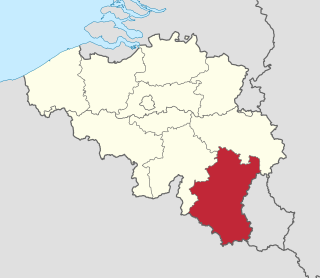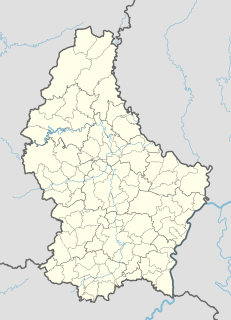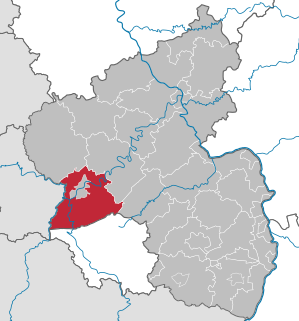
Luxembourg, officially the Grand Duchy of Luxembourg, is a small landlocked country in western Europe. It is bordered by Belgium to the west and north, Germany to the east, and France to the south. Its capital, Luxembourg City, is one of the three official capitals of the European Union and the seat of the European Court of Justice, the highest judicial authority in the EU. Its culture, people, and languages are highly intertwined with its neighbours, making it essentially a mixture of French and German cultures, as evident by the nation's three official languages: French, German, and the national language, Luxembourgish. The repeated invasions by Germany, especially in World War II, resulted in the country's strong will for mediation between France and Germany and, among other things, led to the foundation of the European Union.

The history of Luxembourg consists of the history of the country of Luxembourg and its geographical area.

The economy of Luxembourg is largely dependent on the banking, steel, and industrial sectors. Luxembourgers enjoy the second highest per capita gross domestic product in the world, behind Qatar. Luxembourg is seen as a diversified industrialized nation, contrasting the oil boom in Qatar, the major monetary source of the southwest Asian state.

The Luxembourg Army is the national military force of Luxembourg. The army has been an all-volunteer force since 1967. It has a current strength of approximately 450 professional soldiers—340 enlisted recruits and 100 civilians—with a total budget of $369 million, or 0.9% of GDP.

Luxembourg, also known as Luxembourg City, is the capital city of the Grand Duchy of Luxembourg, and the country's most populous commune. Standing at the confluence of the Alzette and Pétrusse rivers in southern Luxembourg, the city lies at the heart of Western Europe, situated 213 km (132 mi) by road from Brussels, 372 km (231 mi) from Paris, and 209 km (130 mi) from Cologne. The city contains Luxembourg Castle, established by the Franks in the Early Middle Ages, around which a settlement developed.

Luxembourg, also called Belgian Luxembourg, is the southernmost province of Wallonia and of Belgium. It borders on the country of Luxembourg, France, and the Belgian provinces of Namur and Liège. Its capital is Arlon, in the south-east of the province.

Esch-sur-Alzette is a commune with town status in south-western Luxembourg. It is the country's second "city", and its second-most populous commune, with a population of 35,040 inhabitants, as of 2018. It lies in the south-west of the country, on the border with France and in the valley of the Alzette, which flows through the town. The town is usually referred to as just Esch; however, the full name distinguishes it from the village and commune of Esch-sur-Sûre which lies 45 kilometres further north. The country's capital, Luxembourg City, is roughly 15 km (9.3 mi) to the north-east.
Luxair, legally Luxair S.A., Société Luxembourgeoise de Navigation Aérienne, is the flag carrier airline of Luxembourg with its headquarters and hub at Luxembourg Airport. It operates scheduled services to destinations in Europe, North Africa, the Mediterranean and Middle East with additional charter and seasonal services. It is Luxembourg's only passenger-carrying airline.

Jean-Claude Juncker is a Luxembourgish politician serving as President of the European Commission since 2014. From 1995 to 2013 he served as the 23rd Prime Minister of Luxembourg; from 1989 to 2009 he was also Minister for Finances.

Luxembourg Airport is the main airport in Luxembourg. Previously called Luxembourg Findel Airport due to its location at Findel, it is Luxembourg's only international airport and is the only airport in the country with a paved runway. It is located 3.25 NM east of Luxembourg City. In 2018, it handled 4.04 million passengers. By cargo tonnage, LUX/ELLX ranked as Europe's fifth-busiest and the world's 28th-busiest in 2010. Luxair, Luxembourg's international airline, and cargo airline Cargolux have their head offices on the airport property.
The Luxembourg national football team is the national football team of Luxembourg, and is controlled by the Luxembourg Football Federation. The team plays most of its home matches at the Stade Josy Barthel in Luxembourg City.

Trier-Land is a Verbandsgemeinde in the Trier-Saarburg district, in Rhineland-Palatinate, Germany. It is situated on the border with Luxembourg, north and west of Trier. The seat of the municipality is in Trier, itself not part of the municipality.

The Luxembourg national rugby union team is a minor team, and is ranked as a third tier nation. The team participates in the annual Rugby Europe Championship Conference 2 North 2017–18 Rugby Europe Conference. Since 1996 Luxembourg also competes in the sevens circuits in Europe Luxembourg national rugby sevens team.
Multilingualism is a part of everyday life for the population of Luxembourg. Legally and socially, different sectors of Luxembourg use French, German, and Luxembourgish, which is a variety of Moselle Franconian with a large number of loanwords from French. Additionally, most citizens learn English and may study other languages as well. A substantial immigrant population has brought numerous immigrant languages to the small state, notably Portuguese, which is spoken by more than one-fifth of the population. However, the different languages are used in different social situations.

Wolsfeld is a municipality in the district of Bitburg-Prüm, in Rhineland-Palatinate, western Germany. It is around 7 km south-west of Bitburg, and around 10 km from the Luxembourg border.

Valérie Trierweiler is a French journalist and author. She has hosted political talk shows and has contributed to Paris Match. She is best known for having been the partner of the President of the French Republic, François Hollande, until January 2014.

The involvement of the Grand Duchy of Luxembourg in World War II began with its invasion by German forces on 10 May 1940 and lasted beyond its liberation by Allied forces in late 1944 and early 1945.
Trierweiler is a municipality in Germany.
Merci pour ce moment is a 2014 best-selling political memoir authored by Valérie Trierweiler, a French journalist and the former partner of French President François Hollande.




















